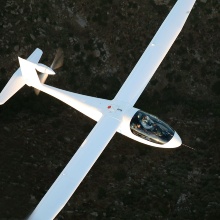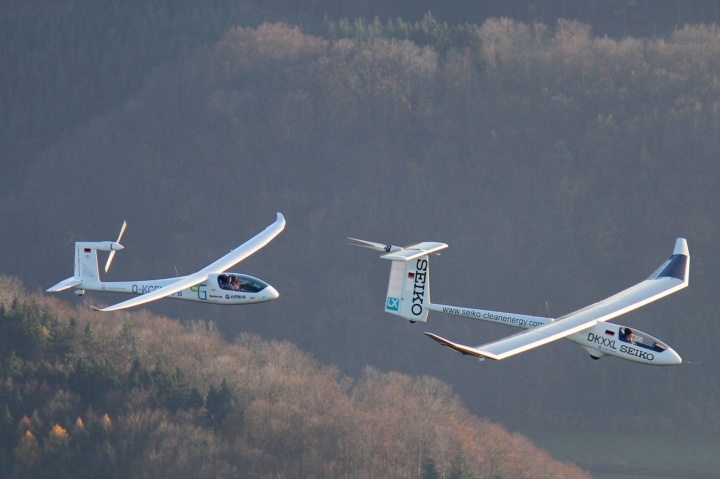Exactly 10 years ago, on May 25, 2011, the two-seater, battery-powered electric aircraft e-Genius made its debut flight, and it is 25 years since the solar aircraft icaré 2 took to the skies for the first time. Both research aircraft from the University of Stuttgart are pioneers of manned electric air travel, and to this day hold several world records from the World Air Sports Federation (FAI). Even though back then the dream of flying without fossil fuels was quite visionary, electric aircraft are now seen as a forward-looking technology in the fight against CO2 emissions in aviation.
The aircraft icaré 2 was designed as a single-seater solar aircraft, and carried out its first official flight on July 1, 1996 at Stuttgart Airport. Thanks to an optimized overall design, the researchers at the Institute of Aircraft Design at the University of Stuttgart were able to show that solar-powered electric flight is possible. The aircraft showed what it was capable of by setting various world records, and even as far back as 1996 the icaré 2 won the Berblinger Prize for the most efficient solar aircraft, which is open to entrants from around the world. Since then the aircraft has been used as a test vehicle for a wide range of technologies, such as differential steering with electric motors on the wingtips which is being tested at the moment.
The two-seater, battery-powered electric aircraft e-Genius made its debut flight on May 25, 2011. With a range of 400 km, it was able to show that small, battery-powered aircraft could be made a reality even using the technology available in 2011. The e-Genius has also been able to repeatedly demonstrate the capability of the overall concept by setting a variety of range, speed and altitude records. In 2015, the first entirely battery-operated crossing of the Alps by an aircraft also took place, with a flight of 690 km between Stuttgart and the Italian city of Varese to the northeast of Milan.
On the way to becoming a hybrid aircraft
The e-Genius is currently being developed into the “e-Genius HPH” version, and is being prepared for its first flight as a serial hybrid aircraft. A combustion engine generates the electricity needed for when the aircraft is cruising – a fuel consumption of 3.0 liters per 100 km is predicted due to the optimized shape of the airplane, which is around 35 percent less than that of conventional modern aircraft with a traditional drive system. Furthermore, using a small but powerful battery system also means it is possible to make a quiet start, and a reserve battery is also available in case of engine failure. “The e-Genius HPH shows that small aircraft which are used for trips of up to 1,000 km can also make a contribution towards climate-friendly mobility”, emphasizes Prof. Andreas Strohmayer, Head of the Department of Aircraft Design at the University of Stuttgart’s Institute of Aircraft Design. “This basic proof of feasibility paves the way for larger aircraft classes with a hybrid electric drive system”.
Both aircraft were developed and built at the Institute of Aircraft Design at the University of Stuttgart’s Faculty of Aerospace Engineering. Three professorships with roughly 70 scientific staff are based at the Institute. The “Manned Aircraft Projects” research group at the Department of Aircraft Design led by Andreas Strohmayer works on energy-efficient and low-emission air travel. Other research focuses of the Institute include lightweight construction, manufacturing technologies and wind energy.
Expert Contact:
Ingmar Geiß, Group Leader Manned Aircraft Projects, University of Stuttgart, Institute of Aircraft Design, tel.: +49 (0)711/685 60528, E-Mail



